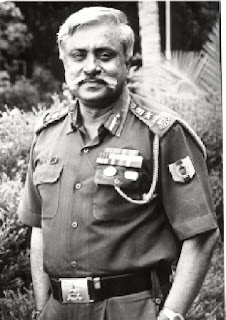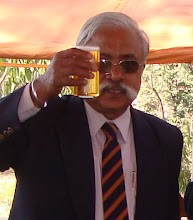RECOLLECTIONS OF AN NCC CADET
[Col R Ravi Nair (Retd)
Santana Dharma College is my Alma Mater and the only College of my allegiance. The Golden Phase of my youth was well spent in this campus. In retrospect, I vividly recall this phase by my intimate relations with NCC primarily and then by my involvement with the College Students’ Union.
Unlike my contemporaries I did not have a pre-university exposure, since I had joined BA English Literature (The premier batch 1965) after having completed the Senior Cambridge Examination from Sainik School. While in the College I had the opportunity of being elected as the Secretary of English Language and Literary Association, the Cabinet Member of Students Union and finally the Speaker (Chairman) of the College Students’ Union under the banner of Independent Student‘s Union (ISU). From a modest member of the Party I could graduate to Party President by the time I left the college. I am convinced that it is the National Cadet Corps, which imbibed in me the confidence and managerial acumen to acquire and hold important offices within the students’ community, and that too devoid of any exterior political influence or sponsors working towards it.
Speaker SD College Students Union 1968-69
The tuition culture was non-existent those days and looked down upon. The college campus reverberated with hectic activities of athletes and games lovers; with Mr.Naidu the Physical Director omnipresent on ground from the last gong for the day till twilight fades. All-round development was the key and no student prematurely worried about a career for one self. The Medicine/Engineering mania was not felt and the parents seemed to desire their wards to spend more time in campus. “Why are you late?”, “ I was in the Hockey field.”, was taken as an impressive alibi by parents. I wonder how many students play hockey, football, basketball or even enter the playing fields or track now a days, other than may be flexing muscles occasionally in a game of cricket?
Enrolling in NCC those days was a natural response to any active and well-meaning student. The nation was still in the fervor of 1965 Indo Pak War and any able-bodied youth desired to be of some service to the cause of National Defence. Enrolment to the NCC was selective and an aspirant had to undergo stringent physical and medical screening and there were many unfortunates who were left out as unfit. We had six Senior Division Companies and the senior ANO (then known as Part Time Officers- PTO) was Major Rajashekaran Nair, He was solidly built, sporting fearsome ‘walrus moustaches’ with a dominating personality and blessed with a ‘Drill Sergeant’s commanding voice’. Cadets and common students were so sacred of him that even the most ‘mis-adventurous’ gave him a slip when he happened to trundle past. He had a dedicated team of PTO’s like Captain PK Padmanabhan Potty, Lieut R Ramachandran Nair, Lieut N Gopalakrishnan Nair, Lieut RV Ramachandran, Lieut MP Subramanian and Lieut CJ Rao. They were a team and fully in control of nearly one thousand cadets and their dealings highly business like. The Battalion Commander was Major Herman (17 Kerala Battalion – then located at Alleppey), and the Group Commander at Thevally Palace, Kollam was Lt Col CV Donoghue.
The defaulters if any were summarily disposed off either by ‘physical handling’ or by awarding stringent punishments on the spot – to be forgotten immediately. One normally found dozens of such ‘unfortunates’ revolving around the parade ground with the rifle held high!!! Long side burns and long hairs were becoming a fashion those days. But an NCC cadet stood out by his demeanor scrupulously insisted and set example by his ANO’s. Senior Under Officers took mostly all theoretical classes including ‘Military Tactics’. One had to spend hours to prepare for the classes one had to take. The only reference book available was a small NCC Handbook. Rest was all left for imagination and how good one is in spinning the yarn !!! But it was a stage to bring out ones latent Instructor prowess.
The Espirit-de-Corps amongst the cadets of the college was commendable. They were one, when it came to competitions. Our competitors were Carmel Poly Technic College (under Major Kuzhuveli – another dedicated ANO) and TD Medical College. As I can recall, the winners were always SD College. SN, St Michael’s and NSS Colleges were in their conceptual stage only.
The cadets took pride in their turnout and they even compromised their precious looks to a tough soldierly bearing, even to the risk of giggles and disapproving comments from the girls. Most of the cadets, specially Under Officers had their own uniforms stitched. Honing impeccable military bearing was the dream of every cadet. The order of the day was that one should see his reflection on the toes of his boots. We discretely took advice and tips from the PI staff on ‘spit-n-polish’ and maintenance of leather, brass and uniforms. The night prior to parade was always spent on spit and polish and starching of uniform. Remember, the ‘terry cottons’ had not entered the market. Upgrading of the issue hackles to nearly one foot long by joining two or three patent hackles used to be a delicate and deft task. One really felt elated fully decked–up like a ‘tonga horse’ and cycling to a NCC parade. One always felt that the ‘world’ around is gaping with admiration!! One felt on top of the world, if one happened to ‘home-on’ to a ‘Ladies only’ bus!! Those were the days! Will it ever come back!!
As Company Sergeant Major -1968
There was an unwritten camaraderie in NCC. A senior cadet always took a junior cadet under his wings. Any mis-adventure with a cadet was taking a big chance with a 1000 strong organisation. Even ANO’s took a stand on this. The ANO was the ‘Guru’ and even the Head of the Department or the Principal had a secondary status. The former always accepted his obligations as such. There had been instances of ANO’s financing the college fees of cadets who could not afford it. That was the bond!! I distinctly remember an incident when the police wanted to make a forced entry into the college campus. The man on fore resisting the attempt was Major Rajashekaran Nair. There were some altercations and finally the police withdrew. The grape –wine is that the ANO ordered the ‘Kotes’ to be opened and the cadets be armed, to defend the sanctity of the campus. May be a myth!! But well accredited! Now days I see a police posse posted permanently within the college. I still recall an incident when an Under Officer cadet was facing dismissal on alleged misbehavior with a girl. The ANO stood-by and even to the great dislike of the management the Under Officer was reinstated. But the summary disposal met out to the Under Officer by the ANO ‘in camera’ is still a mystery. He is a very senior bureaucrat in the Government service.
I as a cadet had just glimpses
of the Battalion Commander and Group Commander. As far as the cadets were
concerned their ultimate was the PTO. When I was detailed by Major Rajashekeran
Nair to attend the Republic Day Parade at Delhi, I raised my fears of missing
the ensuing examinations. He gave me an assurance not to worry on that score.
Now I recall that I had missed all the college examinations, ie: Onam and
Christmas Exams for my entire three years in college. But still the Principal
and the English Faculty always considered me as a disciplined and ‘bright
student’!!
Kerala and Lakshadweep NCC Directorate RD Parade Contingent-1968
Those days the student politics and NCC movement were inseparable. NCC Cadets held nearly all the Students’ Union offices. This arrangement assured disciplined leadership and governance and students accepted it. In my first year the Speaker was Senior Under Officer Sadasivan Pillai. In my second Year the Speaker was Senior Under Officer CM Babu. I followed suite in my third year with the same qualifications. The sad thing is that now a days discipline and politics do not mesh well. I doubt whether any student of importance affluent or effluent is connected with NCC movement.!!!
SD College Students Union Cabinet with Principal Mr Vaidyanathan Sir
and Professors Varma Sir and LC Nair Sir -1968
There were no incentives to cadets as you find now a days. A student got enrolled due to sheer love for uniform and an orderly life. All the Under Officers and cadets who I know and recall have done very well in life and they all reminiscent with reverence their association with NCC in SD college.
I for one, always remember with
gratitude all the PTO’s (ANOs), PI Staff (permanent instructional staff-
deputed from the Three Services) and the functionaries who had given me a
direction in life and also brought to fore latent Leadership qualities including
the confidence to face the world – to make me what I am today.
I also take this opportunity to
pay tributes to the Principals Prof. Akhileswara Iyer and Prof Vaidyanathan and
the Patriarch Sri Parthasarathy Iyengar (reverently known as Pappa Swamy), the
Manager of SD College, for their unflinching and proud sponser and blessings to
me as a student and a functionary of the student community.
Last but not the least, I am
grateful to Prof Iyengar Sir and the members of staff of English Department,
who were proud with a sense of belonging, to one of their student’s
achievements in the extra curricular fields and also encouraged me all
the way for higher goals in life.
-Col (Retd) Ravi R Nair –

.JPG)
%20-%20Copy.JPG)
.JPG)




















